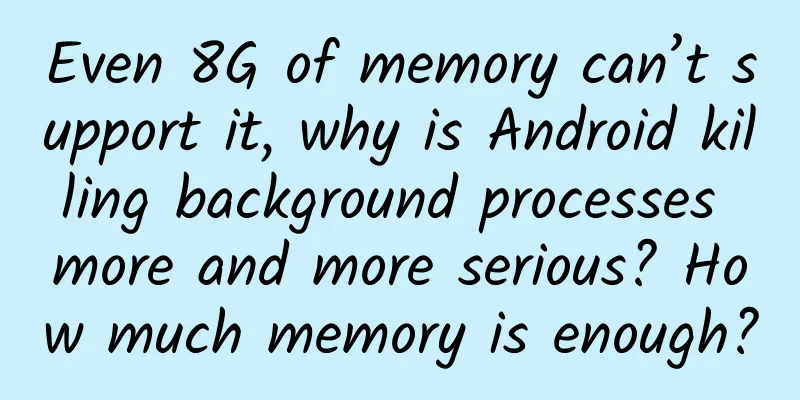Even 8G of memory can’t support it, why is Android killing background processes more and more serious? How much memory is enough?

|
The Android system has now entered the LPDDR5 era, with a frequency of 3200MHz and a maximum memory of 16GB. The reason is that the Android system spends too much on hardware. The Java virtual machine not only has low operating efficiency, but also consumes a lot of memory. Android users must have a habit of clearing the background. But the current development is different. Many manufacturers have begun targeted optimization and added intelligent management background. The fluency has indeed been greatly improved, and the hardware overhead has also been reduced a lot. Even some low-end Android phones can guarantee basic normal use with 4G memory. 6G is already very smooth. But the problem also arises, that is, Android's background killing problem seems to be getting more and more serious. Even with 8G memory, you can clearly feel the background killing behavior. Some software cannot survive in the background at all. Sometimes you just turn off the screen or delay for a while, and you need to reopen it when you enter it again. It is very annoying. In order to use it comfortably, you have to lock the application in the background. In the early Android devices, if you open an app and put it in the background, if you don't clean it up, it will still be saved in the background even after two days. Many apps can't be cleaned up manually, and they will automatically wake up and enter the background to occupy memory, causing the operation to slow down. Now this situation has improved a lot, but the problem of killing background apps is very serious. Although the low-memory version can also maintain smooth operation, the background is basically useless. Why does this happen? Artificial Intelligence = Artificial Intelligence First of all, artificial intelligence is not very smart. The intelligent background actually uses artificial intelligence technology, and the background process management is handed over to artificial intelligence for autonomous judgment. This can indeed save trouble and improve fluency, but artificial intelligence often cannot make accurate judgments and will always clear out things that should not be cleaned up, and complacently think it has done a good thing. After all, artificial intelligence can only be regarded as artificial intelligence at the moment. The method they use to determine is based on usage habits, and battery life is always the priority. Because Android models do not have a unified push mechanism, many applications must remain in the background, such as QQ or WeChat, otherwise you will not receive messages. In addition to these applications with special permissions, many other applications will be killed by Ai once they are not used. When you return to the homepage, Ai will think that you don't want to use it anymore. The result of emphasizing fluency Whether it is the mobile phone system or the application software, the update direction is to add. The functions are becoming more and more abundant and more and more user-friendly, but at the same time, the computing power required is also getting higher and higher, the size is getting bigger and bigger, and it is becoming more and more bloated. This requires a great hardware cost. However, the software is developing very fast, much faster than the hardware. The mobile phone is not like a computer. If the memory is not enough, you can buy a stick to expand it. Therefore, we can only save money through software optimization. Otherwise, there will be insufficient memory, resulting in unsmooth operation. Mobile phone manufacturers prioritize system optimization with smoothness as the priority. Killing background processes can help improve overall smoothness. Although it is sometimes annoying, if we do not want to consume too much memory and still meet the requirement of smoothness, then killing background processes is a helpless move. 8G memory is really not big Is 8G memory a lot for an Android phone? Really not. In fact, it can only be regarded as a standard configuration. After all, iOS has been upgraded to 6GB. 8G memory will basically leave about 3G of available space for daily use. A large game will almost occupy all the memory. Therefore, even with 8G memory, background management is very demanding and cannot be done as you please. Since this year, many models have 8GB of memory in their initial versions. Soon, 8GB of memory will be insufficient. There will even be versions with more memory than 16GB, such as 24GB. Of course, it all depends on the optimization of each company. With the same amount of memory, some phones may not kill background processes in such a way that is abnormal. But in general, the memory requirements of both Android and iOS phones are increasing. So for Android phones, how much memory is enough? We can only say that 4G is barely usable, 6G is smooth, 8G is better, 12G is not too much, and 16G is not too much. In theory, the larger the better, but 8G is enough for ordinary people. In addition, vivo has already used a technology similar to virtual memory on its mobile phones. In the future, more mobile phone manufacturers should follow suit, which can reduce the demand for memory to a certain extent. |
>>: WeChat Bug Hot Search Netizens: I can't receive messages all the time
Recommend
How to do influencer marketing? Share 9 tips!
Recently, due to the popularity of short video ap...
User search behavior value: Analysis of the value of vertical search engine data
Vertical search engines are search windows provid...
How did you get your first 1,000 users? Start with the stupid things!
The story begins with hotmail. In 1996, two engin...
More than 600 scientists jointly published an article: Children are not as tall as their parents? The reason has been found
Being short is a lingering internal injury for mo...
Short video competitor analysis
The short video field is undoubtedly the hottest ...
If you work in the Internet industry, do you really understand traffic analysis?
In my current job, I come into contact with many ...
OTT boxes are in a period of pain and may develop into overseas markets
Internet set-top boxes have received extra "...
Does eating red meat prevent dementia? Does eating chicken cause acid reflux? How to eat meat healthily
In cold seasons, people tend to eat more meat, es...
New media software, what software do you need to operate short videos?
If you want to do your work well, you must first ...
How to change the company entity of WeChat mini program?
Mini Programs can now change their owners. This i...
Deng Shao: Analysis of the overall situation and new business forms of the OTT industry in 2015
In 2015, OTT continued to move in the same direct...
Summary of 7 commonly used sorting algorithms in Java
I have been free for a while, so I took some time...
How do cash loan products promote and acquire customers?
What is a cash loan? At present, the definition o...
After Valentine's Day, it's Lantern Festival? Wrong! It's still Valentine's Day!
Mixed Health I don't understand the health tr...









